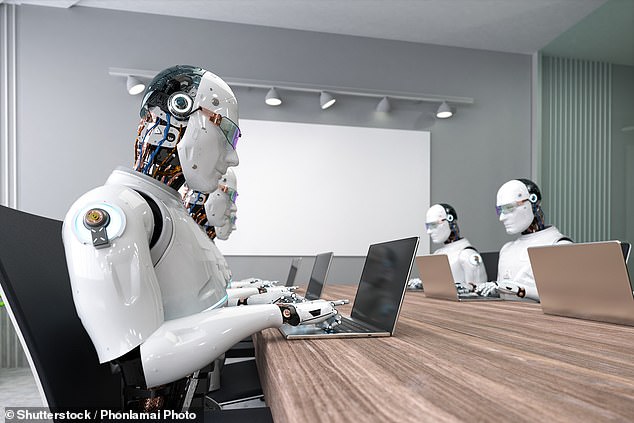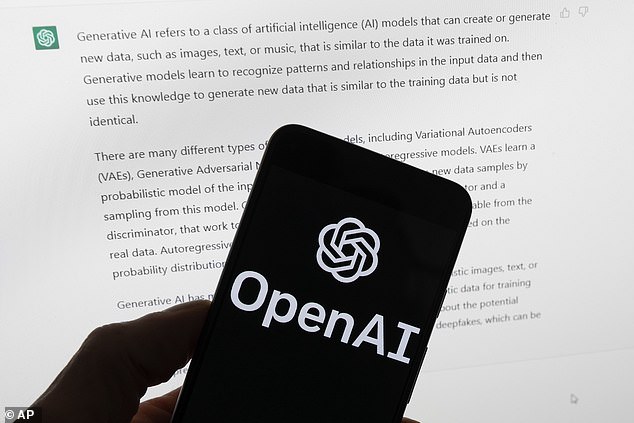The number of new entry-level jobs has fallen by nearly a third since ChatGPT was launched in November 2022, it was reported last night.
Openings for apprenticeships, graduate roles, internships and junior roles with no requirement for a degree fell by 31.9 per cent, according to The Times.
Research by jobs search website Adzuna found that entry-level vacancies only make up a quarter of the overall jobs market, which is down by nearly 4 per cent since 2022.
It comes as more companies outline their plans to use AI to reduce their headcount.
BT said in May 2023 that 10,000 jobs would be replaced by artificial intelligence by the end of the decade. The roles impacted include call handling and network diagnostics.
Its chief executive Allison Kirkby has claimed that advances in AI could result in even more job cuts at the company.
Dario Amodei, head of $61billion AI start-up Anthropic, last month warned that the technology could cut half of all entry-level white-collar jobs within five years.
He said this could increase unemployment by between up to 20 per cent.

The number of new entry-level jobs has fallen by nearly a third since ChatGPT was launched in November 2022

More companies are outlining their plans to use AI to reduce their headcount
James Neave, the head of data science at Adzuna, said AI was a major factor in the reduction of entry-level jobs.
‘If you can reduce your hiring at the entry level, that’s just going to increase your efficiency and improve cost savings,’ he said.
Businesses are facing increasing costs including rises in national insurance contributions and the national minimum wage. The number of entry-level roles fell again by 4.2 per cent in May.
Experts predict a 50-50 chance machines could take over all our jobs within a century.
But a poll of 16,000 workers last year found many employees believe AI could do it already.
Nearly half admitted the technology can outperform them in ‘routine tasks’ – while also paying better attention to detail.
The ‘jobs apocalypse’ is expected to see admin and entry-level roles first – but will increasingly affect those higher paid as it becomes more sophisticated.
The Future of Work Report by jobs website Indeed found just one in three respondents were confident AI would have a positive impact on their role.

A 2024 survey of 16,000 workers found nearly half admit the technology can already outperform them in ‘routine tasks’
The majority however – nine in ten – felt confident they would be able to adapt to the changes over the next five years.
Workers told how much of their day-to-day responsibilities were already ripe for automation – with three in five saying that AI can carry out data analysis better than humans.
Routine tasks (48%) and attention to detail (45%) were other tasks where workers felt AI had the upper hand.
While repetitive jobs are well-suited to AI, workers said they still felt confident they were better in critical thinking, creativity and emotional intelligence.
Asked which jobs are most likely to be untouched by AI in a decade’s time, PricewaterhouseCoopers (PwC) Chief Economist, Barret Kupelian said people should look to traditional trades – with roles plumbers, electricians and decorators
He explained: ‘It appears to me that jobs that require a quite a lot of manual labour…I don’t think the technology is skilled there, in terms of augmenting those skills.’
The PwC spokesman said that roles that require ‘a high degree of judgement and creativity’ are also unlikely to be able to be automated any time soon because they require ‘bespoke skills that are quite difficult to replicate on a digital basis.’

A new study from the IMF found that AI could affect 60 per cent of all jobs in the UK and more than 40 per cent of jobs worldwide
Highly paid professions will see AI boost their wages while lower paid roles are at a significant risk of pay cuts and lay-offs.
A study by the IMF found that clerical workers such as secretaries and clerks are very likely to be replaced by AI because most of their could be done by machines.
However, it is clerical support workers and technical service roles that are most likely to be replaced by AI.
Professionals and managers, although they are very likely to be impacted by AI, are more likely to be impacted positively.
These findings echo a previous study from the Department for Education which found that white-collar professionals were most likely to be replaced by AI.
The study found that accountants, consultants, and psychologists were among the professions most likely to be pushed aside by computers.
Sports players, roofers, and steel erectors on the other hand were considered the least at risk from AI.












